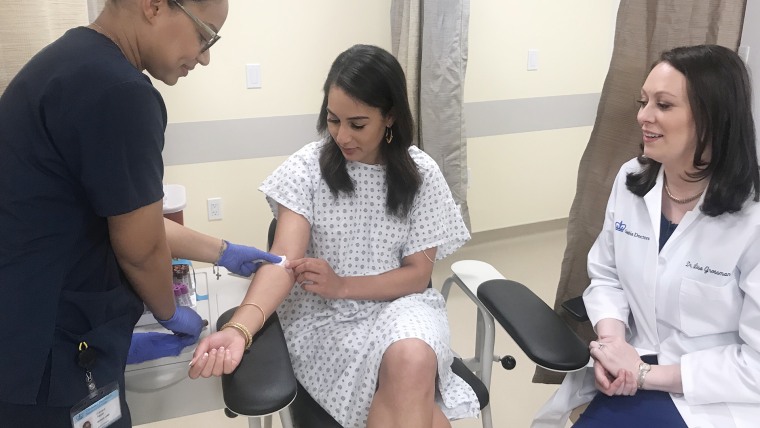As Morgan Radford approached her 30th birthday, she began thinking about another milestone: having her first child.
The NBC News correspondent recently began exploring the idea of freezing her eggs, an option that has become increasingly more popular in the past decade among women in their late 20s and early 30s.
Morgan decided to look into the option after her gynecologist suggested it.
“I said, 'Why?' And she said, ‘You can wait and not feel pressured by any biological clock,’” she said in a TODAY segment for National Infertility Awareness Week.
That clock is ticking louder for Morgan and people her age.
"All my friends were turning 30 this year. So we're all, 'How do we do this? How do we make sure that we have all of our options available?'” she said.
Like other busy professionals her age, Morgan is open to the idea of eventually starting a family, while also pursuing her career.
"I think there's this mythology that women can't have both, and I think I can. And I may not want them both and it all right now, but I want an option to have it," she said.
The process can be expensive, and it's usually not covered by insurance. The cost varies from clinic to clinic and from woman to woman — the amount of medication a woman will need depends on her body, and the medication is pricey. A recent study published in the Reproductive Biomedicine & Society Online found that out-of-pocket expenses ranged from $1,000 to $18,000 per cycle. The average cost per cycle was close to $7,000. Some women need to go through more than one cycle.
Morgan questioned whether egg freezing is the right option for her.
"I also was thinking, 'Look, I have a boyfriend and I am happy. So what if everything went according to plan, and I got married and had a kid naturally? Am I wasting all this money by freezing them?'" she said.
After consulting with her parents and her friends, Morgan called her insurance company and learned it would pay for 75 percent of the procedure.
She then met with Dr. Lisa Becht at the Columbia University Fertility Center, where she underwent the first steps to determine whether she would be a good egg freezing candidate.
During an ultrasound, Becht noticed Morgan’s ovary follicles appeared “suppressed.”
“On average for your age, it is a little bit on the lower side,” Becht said.
But the doctor explained that for some people on birth control pills, "sometimes the follicle number could be less than it truly is."
"You still have follicles. You still have eggs. Definitely we want to get more information,” Becht said.

Next, Morgan had blood work done so doctors could analyze her anti-mullerian hormone, which is produced by the the current egg supply.
“From the blood test, we did see that the number of eggs ... it might be a little bit less than other women your age, but overall, we still think you’d have great chances in doing egg freezing,” Becht said.
“The important thing to know is that it won’t affect your ability to get pregnant naturally. Egg freezing is just a way to have somewhat of an insurance policy, maybe for a second or third child.”
Becht told her that that while egg freezing is a way to help boost chances of pregnancy later in life, nothing is guaranteed.
“We can never ensure that that will definitively lead to a pregnancy in the future. But freezing them earlier will definitely be helpful,” she said.
Morgan appeared visibly nervous as she awaited the results, but she admitted she got some assurance from a phone call she made minutes earlier with her mother, who said her story could be “a blessing in disguise” for others.
“Because there are thousands of women just like me — 29, 30 — who simply just don’t know their status,” she said.
“What Dr. Becht just told me gives me enough information to be a little bit more proactive in a way that frankly may have changed my life, and so now I can be the author of my own story.”
